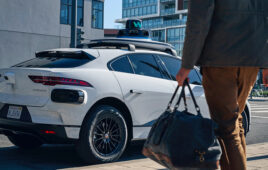|
Listen to this article
|

Motional is shifting from deploying robotaxis and to developing and generalizing its driverless technology. | Source: Motional
Aptiv PLC and Hyundai Motor Group have completed their ownership restructuring transitions for Motional AD LLC. Earlier this year, Aptiv said it would stop funding Motional after incurring millions of dollars in losses.
Aptiv had forecast a non-cash equity loss of about $340 million in 2024. Now, Aptiv has sold an 11% common equity interest in the autonomous vehicle developer to Hyundai for about $448 million of cash consideration.
The mobility software company also exchanged 21% of its common equity in Motional for a like number of Motional preferred shares.
Hyundai doubles down on driverless development
Despite Aptiv pulling out, Hyundai has doubled down on its investment. This week’s news came just weeks after Hyundai announced a $475 million funding round for Motional. With the funding, these transactions have resulted in the reduction of Aptiv’s common equity interest in Motional from 50% to just 15%.
Boston-based Motional said its latest investment demonstrates Hyundai’s belief in the strategic importance of autonomy technology and its confidence in the company’s ability to capitalize on the market opportunity.
Aptiv is a leading automotive parts supplier. It launched Motional with Hyundai in 2017 as a joint venture initially worth $4 billion.
Since its inception, Motional has introduced its all-electric IONIQ 5 robotaxi with a fully integrated Level 4 autonomous vehicle (AV) system. The company has established partnerships with Uber and Lyft to deploy its AVs in their networks.
To date, Motional said it has completed more than 100,000 autonomous rides in Las Vegas, and thousands of autonomous food deliveries in Los Angeles.
Motional steers away from mass robotaxi deployment
Motional said its mission is to make driverless vehicles a safe, reliable, and accessible reality. While Hyundai’s latest investment will help move this mission forward, the company acknowledged that it is pumping the brakes on new driverless deployments.
Driverless vehicles will enter the market when the technology behind them has evolved, and when the business case for autonomous development is clear, it said.
“While we’re excited by our pace of technical progress, and our initial commercial deployments have yielded valuable insights, large-scale deployment of AVs remains a goal for the future, not the present,” Karl Iagnemma, president and CEO of Motional, wrote in a blog post.
The company updated its strategic plan in collaboration with its shareholders. It plans to focus its resources on the continued development and generalization of its core driverless technology. At the same time, it’s de-emphasizing near-term commercial deployments and ancillary activities.
The company said this updated strategy required streamlining its teams, resulting in a reduction in staff across the business.
“Having spent my entire career in developing robotic and autonomous technology, I remain convinced that AVs will have a transformative, positive impact on the way we move, with the capability to dramatically improve roadway safety, reduce emissions, and enhance the overall experience of personal transportation,” said Iagnemma. “I’m confident in the road ahead and Motional’s ability to achieve its mission of making driverless vehicles a reality.”







Tell Us What You Think!